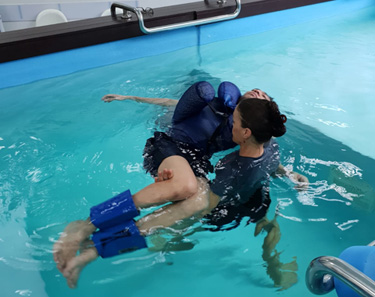
 Watsu is a form of aquatic therapy derived from Zen Shiatus – hence the name Water Shiatsu (WATer ShiatSU). Developed in the 1980s, Watsu is used for deep relaxation, rehabilitation, and profound physical release of tension. Watsu is practiced globally in hospitals, clinics, and spas, used for physical rehabilitation of injury and disability and to treat orthopedic and neurological conditions. Watsu is also effective in helping people overcome near-drowning experiences and other water traumas.
Watsu is a form of aquatic therapy derived from Zen Shiatus – hence the name Water Shiatsu (WATer ShiatSU). Developed in the 1980s, Watsu is used for deep relaxation, rehabilitation, and profound physical release of tension. Watsu is practiced globally in hospitals, clinics, and spas, used for physical rehabilitation of injury and disability and to treat orthopedic and neurological conditions. Watsu is also effective in helping people overcome near-drowning experiences and other water traumas.
What will happen during a Watsu session?
Watsu is provided in a shallow pool heated to near body temperature (95-97 degrees) to avoid chilling. If needed, floats are wrapped around the patient's legs to provide buoyancy.
Held securely by the Aqua-Physiotherapist, the patient floats on his or her back, eyes, nose and mouth always above the surface of the water; ears below, and eyes closed. Guiding the body through the water, the Aqua-Physiotherapist gently stretches, bends and twists the body, rotating shoulders and hips to carefully maximize joint movement.
Mild to moderate massage is added to enhance the experience. Periods of stillness are included so that the subconscious and physical effects can integrate. Muscle tension is released, diminishing many physical pains, creating emotional calming and centeredness.
Watsu promotes a deep state of relaxation with dramatic changes in the autonomic nervous system. Through quieting the sympathetic and enhancing the parasympathetic nervous systems, Watsu has profound effects on the neuromuscular system. These changes benefit clients with a wide variety of special needs.
Physiological changes that occur throughout the body may include:
Orthopedic (spinal) and Rheumatologic Special Needs:
Watsu helps decrease muscle tension and increase range of motion. The support of the water provides relief from compression forces in the joints. The movements through the water provide gentle stretching into all ranges for the spine and extremities while these joints are unloaded. Soft tissue and joint mobilization techniques may also be incorporated into a Watsu session.
Clients report decreased pain as Watsu decreases their muscle spasm and muscle guarding, increases their range of motion, and promotes profound relaxation. Many clients also report a decrease in their emotional pain.
Comments from receivers:
“This is the most wholesome activity I can experience because it treats my whole body, mind and spirit. It helps my aches and pains, calms my mind and lifts my spirit.”
“I am profoundly relaxed at the conclusion, much more so than at the end of having a table massage, having had table massages for 32 years.”
“Not pain-free at the end of a session but feeling so much better and knowing that I will sleep better than any other time.”
“Let me count the ways that it has helped me: Watsu has improved my quality of life. There is a euphoria that lingers and as it fades it is replaced by a feeling of well-being
Neurologic Special Needs:
Watsu helps decrease hypertonicity, including spasticity and rigidity. The rhythmical, gentle rocking motions in warm water coupled with the repeated trunk rotation and trunk elongation are helpful in decreasing abnormal muscle tone.
Benefits of Watsu:
Aqua-Physiotherapists utilizing Watsu as part of their aquatic therapy treatment programs report the following improvements in their clients:
Any healthcare professional who utilizes bodywork as part of his/her practice will benefit from learning Watsu. Some professionals will utilize Watsu as the primary intervention in their treatment programs. Others will find their clients benefit the most when Watsu is used as just a portion of the treatment program or as part of each treatment session. Aqua-Physiotherapists find Watsu to be especially beneficial for clients who are having difficulty with functional, daily life skills secondary to pain, stiffness, muscle spasm or spasticity.
Conditions Treated by Watsu:
Watsu massage is safe for children, pregnant women, the elderly, and people with disabilities. The following conditions can benefit form Watsu:
Many clients report that nothing else is as effective in decreasing their pain and improving their ability to move.
Research on the benefits of Watsu is underway on an international level. An 18-month self-assessment study of 16 residents at a retirement center receiving 30-minute sessions twice monthly concluded that 73 to 100% of the clients reported end-of-session no-to-minimal pain and stress and a much greater level of body flexibility and the ability to relax. Even more importantly, the majority (60 to 78%) reported diminished pain and stress up to three days or longer following the session.
Sources: